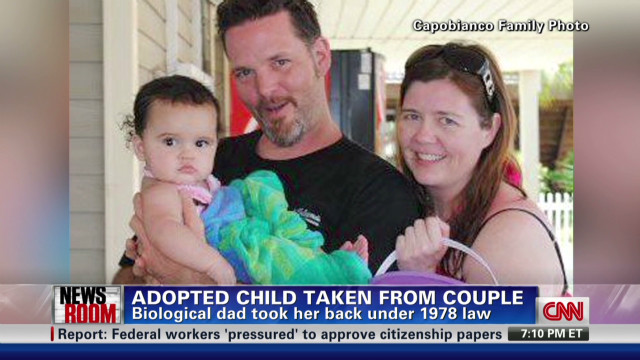
For the first few moments of her life, Veronica was with her birth mother.
For the next two years, she was with her adoptive parents.
And for the last week, the toddler has been with her biological father, over 1,000 miles away from the only home she'd ever known.
It's been a long, complicated journey for young Veronica -- one made possible by a federal law meant "to protect the best interests of Indian children" that, in the process, has tugged at the heartstrings of all involved.
The story began in 2009, when Veronica's biological mother and father, Dusten Brown, signed a legal document agreeing to put the girl up for adoption. Brown's attorney, Shannon Jones, says that her client signed the waiver but didn't quite understand it.
Soon after the girl was born, Brown -- a U.S. Army soldier -- headed off on a 1-year deployment. It was then that the baby moved on as well, to the Charleston, South Carolina, home of Matt and Melanie Capobianco.
It was an open adoption, family friend Jessica Munday said. That meant the girl's birth mother could and did maintain a relationship with the girl.
But Brown, the biological father, wasn't on board. Four months after Veronica's birth, he began legal proceedings seeking custody of her.
"My client has been fighting for custody of his daughter since shortly after her birth," Shannon Jones, Brown's Charleston-based lawyer, said by e-mail. "He loves this child with all his heart."
Brown appeared to win that battle late last year. On New Year's Eve, he arrived in South Carolina, picked up Veronica from her adoptive parents, and headed west to his home in Oklahoma.
"It's awful," Matt Capobianco said days later to CNN affiliate WCIV. "Everyone keeps saying how bad they feel for us. But, I mean, she's a 2-year-old girl that got shoved in a truck and driven to Oklahoma -- with strangers."
Key to Brown's case is a 1978 federal law called the Indian Child Welfare Act.
Its aim is to "promote the stability and security of Indian tribes and Indian families by the establishment of minimum federal standards to prevent the arbitrary removal of Indian children from their families and tribes and to ensure that measures which prevent the breakup of Indian families are followed in child custody proceedings."
Brown is enrolled in the Cherokee Nation, a "federally-recognized government" of Indians that has "inherent sovereign status," based near Tahlequah, Oklahoma. That means young Veronica has Indian blood, as well.
Chrissi Ross Nimmo, assistant attorney general for the Cherokee Nation, says that the protections inherent in the Child Welfare Act are clear and important. Applied as she sees it, Brown -- as an Indian and the biological father of Veronica -- is entitled to custody of the girl.
"There's a placement preference. If children are removed by the state or if they're placed in private adoption, the first preference is for a family member," Nimmo told CNN affiliate KOTV.
Others disagree. CNN legal analyst Avery Freedman, for one, said the law was misused in this case.
"It's a wonderful law which seeks to protect the integrity of ... Native American families," she said. "But it cannot be used as a bludgeon to destroy existing families."
Jones insists that Brown "would still be entitled to custody of his daughter under South Carolina law."
"It is important to understand that the Indian Child Welfare Act was not used as a loophole in this action," the lawyer said.
Whatever the legal arguments, the emotions are still raw. The Capobiancos have spoken to Veronica once since she left, on New Year's Day.
"She said, 'Hi Mommy! Hi Daddy! She sounded really excited to hear us. And she said, 'I love you!' numerous times," Melanie Capobianco told WCIV.
She added that her husband felt like he'd failed as a father, sending her off with people she didn't know and not knowing what the little girl must think of them and the whole situation.
Melanie Capobianco said she is worried about what's next, and how Veronica is getting through each day and night.
"We just wish we could be there, if she was afraid," she said.
Source: CNN